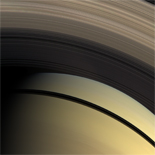
Rings (NASA, JPL, SSI)
TTh 2:00-3:30 · RLM 15.216B · Unique No. 49600
Professor
Courses - Fall '09
|
Blackboard [Bb]
|
Supplementary site
Approach
The course is
designed to give you some experience in the areas of mathematics that may be important to you
at various times in your career. This course differs from others in that you may have no interest
in a particular technique at this point in your career, and yet years from now your familiarity with
it may allow you to explore a new field of astrophysics, or a new aspect of an old one.
The topics I have picked are subject to revision as we see how things go during the semester.
They are based on a survey of the departmental and observatory faculty, research staff, and
graduate students. They represent a sort of consensus of the most useful topics for astrophysics.
We each bring very diverse interests and experiences to this course, as well as vastly different
mathematical preparation. If you are among the better prepared, this course is a way to fill-in
the holes you have in your mathematical preparation, and review and refine your understanding
of the areas you are already familiar with. If you have not been previously exposed to most of this
material, you may have to spend a little more time reading some of the recommended texts. If this
is you, be consoled that there is no better time in your career to do this than now.
Mathematics is a tool for doing science. It is to science what technique, or "chops", are to musicians.
This is a chance to improve your chops. Be careful though, because the analogy works in another way
as well. Your chops are not static. If you don't practice them, you will lose them. I'm living proof of that!
So in the future, you must revisit these subjects occasionally to keep your understanding sharp and fresh.
Make this easy on yourself, and keep your notes.
Grading
We will divide into groups, based on research interests. We will select applications from each area of
research represented. Your group will make a short presentation of these applications. Your grade will be the
average of these scores (weighted 60%) plus your class participation score (weighted 40%).
Read the notes in advance of each day's lecture and bring your questions. I will then cover the key elements from
the notes and respond to your questions. At the beginning of each lecture a student, selected by me, will
summarize the previous lecture.
We will discuss the possibility of exams and problem sets in class.
